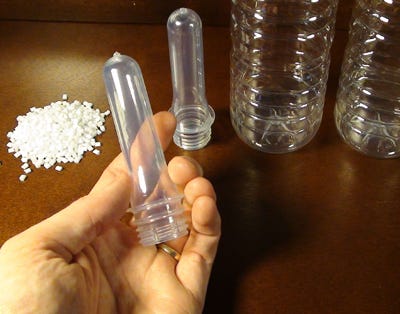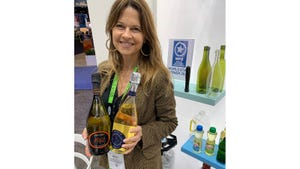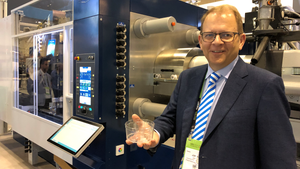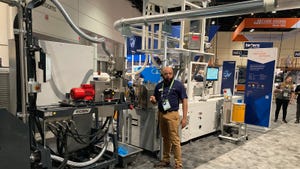ENSO Bottles introduces first biodegradable and recyclable PET bottles
Aquamantra, a bottler of energy enhanced natural spring water based in Dana Point, CA, investigated the many environmentally friendly bottle alternatives on the market. PLA, they discovered, has many challenges to overcome before becoming a viable alternative. “The reality is that water has to be packaged in a bottle that will not disintegrate on the store shelf, and that’s an issue with the PLA bottle,” said Aquamantra founder and president Alexandra Teklak.
October 21, 2009
Aquamantra, a bottler of energy enhanced natural spring water based in Dana Point, CA, investigated the many environmentally friendly bottle alternatives on the market. PLA, they discovered, has many challenges to overcome before becoming a viable alternative. “The reality is that water has to be packaged in a bottle that will not disintegrate on the store shelf, and that’s an issue with the PLA bottle,” said Aquamantra founder and president Alexandra Teklak. “We investigated the ‘Oxo-degradables,’ but there were ‘big ifs’ surrounding them, such as an adequate amount of exposure to sunlight for degradation and plastic fragmentation.”
Finally, Aquamantra found ENSO Bottles LLC (Phoenix, AZ), the North American distributor of EcoPure for the PET bottle market. EcoPure is an additive that represents a scientific advancement in biodegradable PET bottles. Adding EcoPure to PET bottles allows them to biodegrade in aerobic and anaerobic environments and, more important, be recycled along with standard PET bottles because they have the same physical properties as standard PET bottles. PET bottles made with EcoPure do not fragment, degrade, or break down from environmental factors such as UV radiaion, moisture, or oxygen.
|
This is significant, noted Danny Clark, president of ENSO Bottles, because manufacturers of traditional PET bottles do not have to invest in new capital equipment to process the bottles with EcoPure. The EcoPure additive is compatible with all petroleum-based polymers, has been proven through extensive testing to make plastic biodegradable when discarded at a landfill or compost facility, and is perfectly safe for food and drug packaging, meeting all FDA requirements. EcoPure is manufactured in the USA by Bio-Tec Environmental LLC, at the company’s facility in Albuquerque, NM.
John Barnes, account manager for Bio-Tec Environmental, confirmed that because the carrier for the additive is PET, any PET bottles containing the EcoPure additive are compatible with traditional PET in the recycling stream. “The specific gravity of the pellets containing the EcoPure homogenizes with regular PET so there is no effect on recycling flow nor any degradation of any part of it,” he said. “Only about 1% is the EcoPure product, so there is no effect on the recycling stream because it’s the same as the master blend.”
Barnes stated that the company has not found any resin in which EcoPure isn’t compatible, including HDPE, LDPE, PP, and even nylon, making EcoPure very versatile and very flexible for use in a wide range of products in which biodegradability is desired as an end-of-useful-life result. Also, unlike some bio-based formulas such as PLA, the EcoPure can withstand temperatures up to 600ºF.
“We’ve actually blended EcoPure with PP and PS, and have done the ASTM testing and come up with startling results. Polypropylene had a 45% loss of mass of the original sample after just 14 days. With such a high percentage we know it’s more than just the additive material biodegrading,” said Barnes. ”Our product is different from other bio-plastics—there’s no starch, no food products—and with the carrier for our product being PET, it reconstitutes the basic elements back into it through a scissoring process allowing it to crack, but that doesn’t happen until it gets to a microbe-based environment.”
Clark said that one problems with additives that had to be overcome was the cloudiness that occurs within the PET preforms. While the preforms containing EcoPure appeared to be cloudy, once blowmolded, the bottles are extremely clear with no cloudiness. “That’s one of the major benefits of EcoPure,” said Clark.
ENSO bottles biodegrade into biogases (methane) and biomass in anaerobic (landfill) environments, and ENSO promotes the use of landfill biogases to be used in creating clean energy.
ENSO’s Clark said that he and Bio-Tec are still working with the recycling industry to gain their trust in the recyclability of the EcoPure in PET bottles. “The Association of Postconsumer Plastic Recyclers (APR) and the National Association for Plastic Container Resources (NAPCOR), have a few press releases out stating they’re rather unsure about the technology at this point,” said Clark. “We’ve sent sample materials to the recyclers directly so they can see that there’s no change in the melt flow or quality of the recycled material. A number of them are now ready to accept these bottles into their recycling stream based on the test results that we’ve done, and were still in conversation with APR and NAPCOR as they continue looking at it.”
PET is the most recycled plastic there is and it’s easy to recycle, Barnes noted. “We tried to target the EcoPure toward a market where we thought the product would have a likelihood of ending up in a landfill. The typical landfill is where we want our product to end up, because it promotes biodegradability. Still, nothing is better than a product that is both recyclable and biodegradable,” he stated, adding that he hopes EcoPure can eliminate the bad rap that plastics have gotten over the years. “With our product, within one to five years plastics containing EcoPure will all be gone from the waste stream.” —Clare Goldsberry
About the Author(s)
You May Also Like





